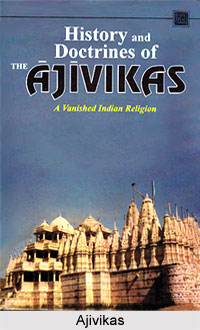 Ajivika is an ancient Indian religion and the Ajivikas were the contemporaries of the early Buddhists and historical Jains.It is considered that Ajivikas may have been a loosely organized group of wandering ascetics. However this section has completely disappeared and its scriptures have vanished with it. From scattered scriptures in several inscriptions of the Mauryan Empire and Buddhist and Jain sources, it is clear that the basic doctrine of Ajivikism was fatalism and did not believe in karma or the possibility of free will. Since there was no such record of Ajivikism it is possible that the outsiders have given the name. The Ajivikas believed that human soul underwent transmigration which was determined by Niyati (destiny or fate) and human free will is an illusion .The course of transmigration was rigidly fixed were all beings went through an enormous series of rebirths until the last niyati brought them to a stage where they would ultimately achieve salvation.
Ajivika is an ancient Indian religion and the Ajivikas were the contemporaries of the early Buddhists and historical Jains.It is considered that Ajivikas may have been a loosely organized group of wandering ascetics. However this section has completely disappeared and its scriptures have vanished with it. From scattered scriptures in several inscriptions of the Mauryan Empire and Buddhist and Jain sources, it is clear that the basic doctrine of Ajivikism was fatalism and did not believe in karma or the possibility of free will. Since there was no such record of Ajivikism it is possible that the outsiders have given the name. The Ajivikas believed that human soul underwent transmigration which was determined by Niyati (destiny or fate) and human free will is an illusion .The course of transmigration was rigidly fixed were all beings went through an enormous series of rebirths until the last niyati brought them to a stage where they would ultimately achieve salvation.
Sources say that in India Ajivikas remained a significant element in the religious life of the Ganges plain until the end of the Mauryan Empire (third century A.D.) and dying out by the Gupta era (fourth century A.D.)They survived in parts of Tamil Nadu until the fourteenth century. Some regard Makkhali Gosala as the founder of the Ajivika faith ;other sources state that Gosala was a leader of a large Ajivika congregation, but was not the founder of the movement. Another leader of the Ajivikas was Purana Kassapa.
Ajivika adherents followed a strict regimen of asceticism, similar in many ways to the practices undertaken by the Jains-extreme fasting, indifference to physical discomfort. Makkhala Gosala was often described as living without clothing, as some other senior Ajivika adherents. It is not clear if all Ajivikas lived as naked wanderers or only some extremely devout monks followed this. They were strongly against the castes system and emphasized on equality. Ajivika is an anti-caste philosophy, which literally translates to "following an ascetic way of life". There are stories about the orthodoxy of Ajivika leaders where they ended their lives voluntarily when they felt that their bodies or minds were beginning to decline-either by fasting to death, or, in the case of Purana.
Whatever is known about the Ajavikas today the credit should be given to the Jains for maintaining the records.




















